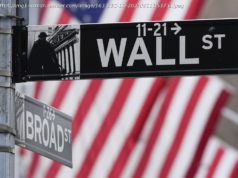U. S. stocks dropped for a second straight day on Friday, weighed down by another rise in Treasury yields in the wake of a solid jobs report that capped off a week of robust data.
(Reuters) — U. S. stocks dropped for a second straight day on Friday, weighed down by another rise in Treasury yields in the wake of a solid jobs report that capped off a week of robust data.
The losses were led by heavyweight stocks in the technology and communication services sectors including all members of the so-called FAANG group – Facebook ( FB. O), Amazon ( AMZN. O), Apple ( AAPL. O), Netflix ( NFLX. O) and Alphabet ( GOOGL. O). Online retailer Amazon, part of the consumer discretionary sector, lost 1 percent.
Nonfarm payrolls increased less than expected in September, likely due to the effect of Hurricane Florence, though data for July and August was revised higher, and the unemployment rate fell to 3.7 percent, a Labor Department report showed.
“There’s no question the job market in the United States is possibly at its best in a generation — there’s no question or debate about that,” said Russell Price, senior economist at Ameriprise Financial Services Inc in Troy, Michigan.
“The jobs report has become an inflation report.”
The report pushed longer-dated U. S. Treasury yields higher, with the 10-year US10YT=RR note touching 3.248 percent. That piled more pressure on U. S. stocks, which are trading near record-high levels, raising concerns about valuations in the pricier names with the corporate earnings reporting season on tap.
After the data, interest rate futures traders were still largely expecting a Fed rate hike in December while the bond market’s gauges on investors’ inflation outlook rose.
“Equities will have no choice because if they don’t remain competitive with the risk-free rate of return people will stop buying them anyway and they will start going into bonds,” said Walter Zimmerman, chief technical analyst at ICAP in Jersey City, New Jersey.
“How does the stock market adjust for that? By lowering the price and therefore increasing the rate of return.”
The Dow Jones Industrial Average. DJI fell 180.43 points, or 0.68 percent, to 26,447.05, the S&P 500. SPX lost 16.04 points, or 0.55 percent, to 2,885.57 and the Nasdaq Composite. IXIC dropped 91.06 points, or 1.16 percent, to 7,788.45.
For the week, the S&P fell 0.98 percent, the Dow slipped 0.04 percent and the Nasdaq dropped 3.2 percent. It was the biggest weekly decline for the Nasdaq since March.
Still, equities closed off session lows. The S&P found support at its 50-day moving average at 2,877 and the Nasdaq at its 100-day moving average of 7,778.
The technology sector. SPLRCT sank 1.27percent, dropping for the second day in a row on a fall in Intel ( INTC. O) and Microsoft ( MSFT. O).
Apple fell 1.6 percent after David Einhorn’s Greenlight Capital said it sold its remaining shares in the company on growing fear of “Chinese retaliation against America’s trade policies”.
The recently constituted communication services sector. SPLRCL, which houses Netflix, Facebook and Alphabet, dropped 1.04 percent.
The only gainer among the 11 major S&P sectors were defensive utilities. SPLRCU, which advanced 1.57 percent.
Tesla slumped 7.05 percent after CEO Elon Musk stirred nerves about the settlement of his securities fraud lawsuit by mocking the U. S. Securities and Exchange Commission on Twitter. Einhorn said his Tesla short was the second biggest winner last quarter.
Declining issues outnumbered advancing ones on the NYSE by a 2.15-to-1 ratio; on Nasdaq, a 2.27-to-1 ratio favored decliners.
The S&P 500 posted 10 new 52-week highs and 24 new lows; the Nasdaq Composite recorded 17 new highs and 118 new lows.
Volume on U. S. exchanges was 7.62 billion shares, compared to the 7.16 billion average for the full session over the last 20 trading days.






